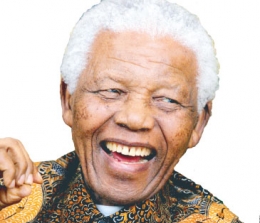Former South African President Nelson Mandela has passed away at the age of 95.
The man who was the symbol for a free and democratic South Africa won the Nobel Peace Prize in 1993 for his leading contributions against apartheid in the nation, just three years after his release from prison and a year before he was elected president of the ‘Rainbow Nation’.
Born into the Madiba clan in Umtata (now Mthatha) in Eastern Cape as Rolihlalah Mandela on 18 July 1918, he was a descendant of royalty and understood the importance of equality and education – and also of dissent.
Mandela was expelled from Fort Hare University while pursuing his undergraduate degree for his involvement in boycotts against university policies, his first record of political activism.
During the 1940s, Mandela joined African National Congress (ANC) as an activist and soon established the party’s Youth League. Later he opened the first black legal firm in South Africa in 1952, providing low-cost counsel to black people in need.
In 1961, Mandela co-founded and became the leader of Umkhonto we Sizwe, which embarked on direct action against the apartheid regime via guerrilla attacks on government facilities and infrastructure (it later became the armed wing of the ANC and was responsible for bomb attacks that took civilian lives).
Following a 1962 tour of north and west Africa to garner support for the ANC movement, Mandela was arrested and charged with inciting workers to strike and for leaving South Africa without permission. He was sentenced to five years in prison, and was serving that term when a subsequent trial – known as the Rivonia Trial – found him guilty of conspiracy to violently overthrow the government. Mandela was thereafter transferred to the prison on Robben Island, off Cape Town, to serve a life sentence.
Then aged 46, Mandela was classified as the lowest level of prisoner, living in a damp cell with nothing but a straw mat to sleep on and put to work breaking rocks into gravel. Meanwhile, the struggle for civil rights for black people and other minorities spread around the world throughout the 1960s and ’70s, and by 1980 the slogan ‘Free Mandela’ was born, leading to an international campaign calling for his release.
That release finally came in 1990 to global applause, and Mandela was shortly after chosen to lead the ANC, which he said still intended to continue its opposition to apartheid – though the writing was already on the wall for that racist regime.
In 1993 Mandela shared the Nobel Peace Price with then South African President FW de Klerk “for their work for the peaceful termination of the apartheid regime, and for laying the foundations for a new democratic South Africa”. The following year, the country’s transformation was confirmed when Mandela was elected the first black president in the first fully democratic election in South Africa’s history.
The ‘long walk to freedom’ (as per the title of Mandela’s memoirs) would not be an easy one. But 1995 saw one of the first major steps towards racial reconciliation in South African society, when the country hosted – and won – the Rugby World Cup, returning to the world sporting stage after years of boycotts. Mandela proudly wore a Springboks shirt – previously a symbol of the apartheid establishment – as he presented the trophy to captain Francois Pienaar, who declared in his victory speech that he and his team-mates had won the cup for all of South Africa.
In 1999 Mandela was succeeded as South African president by Thabo Mbeki, and he spent the following years meeting with world leaders and supporting a wide variety of charities – especially those involved in the fight against HIV/Aids, which killed his son Makgatho in 2005, as announced by Mandela himself in an attempt to battle the stigma of the disease.
Mandela was married three times in his life, firstly to Evelyn Ntoko Mase in 1944, with whom he had two sons and two daughters before divorcing in 1957. The following year he marries Winnie Mandela, who became a central figure of political discord in South Africa during his long imprisonment. Following his release the couple separated in 1992, divorcing in 1996. Two years later, Mandela married Graça Machel on his 80th birthday, and the couple remained together until his passing.
Nelson Mandela successfully broke down barriers of prejudice in South Africa, a country damaged by decades of racist leadership, and rose to the forefront of global political activism. Despite his involvement in paramilitary action, he is remembered far more for his use of peaceful negotiations to overcome the apartheid regime. Beyond his peace campaigns, in his later years Mandela played a significant role in the battle against Aids. His memory will live on for countless years to come in support of the invaluable messages he delivered to the global stage during his lifetime.
Nelson Mandela’s full state funeral was scheduled to take place today 15 December in Qunu, Eastern Cape. He is survived by his third wife Graça Machel and three of his children, Makaziwe, Zeni, and Zindzi.












